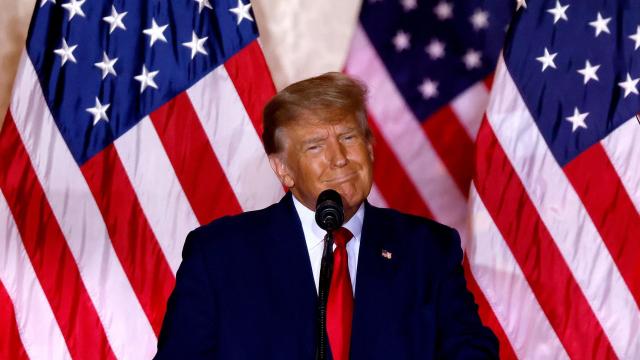Meta’s own policies around fact-checking political candidates may be pigeonholing them into hosting a groundswell of new, immaculate Donald Trump-authored ravings.
The former president officially announced his candidacy for the 2024 presidential election on Tuesday evening in front of a rowdy crowd at his Mar-a-Lago estate. That single act of formally declaring his re-election bid triggers Meta policies preventing the company’s third party fact-checkers from intervening on politicians’ posts. And even though Trump himself remains banned on most major platforms, the fact-checking ban still applies to content crafteted by him that’s then shared by others on the plattform, according to a company wide memo obtained by CNN.
“If former president Trump makes a clear, public announcement that he is running for office, he would be considered a politician under our program policies,” the memo reportedly reads.
That memo served as a reminder to the company’s fact-checkers — some of whom had requested guidance ahead of the Trump announcement — that they cannot apply misinformation labels to Trump’s original content. The rule, importantly, doesn’t just apply to Trump but includes all political figures. Still, the former president’s notorious reputation as a leading disseminator of blatantly false bullshit reportedly led a manager on Meta’s “news integrity partnership” team to send out the email to fact-checkers reminding them of their new limitations.
“Political speech is ineligible for fact-checking,” the manager said according to CNN. “We define a ‘politician’ as candidates running for office, current office holders — and, by extension, many of their cabinet appointees — along with political parties and their leader.”
Types of political speech ineligible for fact checking, the memo noted, includes their words spoken or written as well as photos, videos, or, “other content that is clearly labelled as created by the politician or their campaign.” As with many of Meta’s content moderation policies though, there are some caveats. While the company’s platforms won’t send politicians’ organic content or ads (meaning things they themselves posted) to their fact-checkers, they are willing to demote “previously debunked” content shared by those politicians.
Meta did not immediately respond to Gizmodo’s request for comment.
It’s during times like these where an average person might genuinely wonder why Meta’s fact-checking apparatus doesn’t apply to politicians in the first place. Meta’s point of view, which it’s maintained since at least 2019, is that it simply shouldn’t be the one calling balls and strikes on political matters. Fact-checking politicians, they say, would potentially put them in the uncomfortable position of suppressing political speech, something a mouthy faction of Republican lawmakers already regularly accuse them of doing.
“To use tennis as an analogy, our job is to make sure the court is ready — the surface is flat, the lines painted, the net at the correct height,” Meta President of Global Affairs Nick Clegg said during a 2019 speech. “But we don’t pick up a racket and start playing. How the players play the game is up to them, not us.”
“At Facebook, our role is to make sure there is a level playing field, not to be a political participant ourselves,” Clegg added.
On the other hand, content moderation researchers and some Meta fact-checkers have spoken out critically against the political fact-checking ban with a few even calling on the company to kill the practice. In the worst cases, fact-checkers like PolitiFact Executive Director Aaron Sharockman warn eager lie spreaders and truth distorters could simply launch a feigned bid for president or other elected offices as a loose cover to skirt around the company fact-checking protections.
“Facebook has to remove the exemption for politicians or they risk Trump (or others) filing to run for office solely for the purpose of publishing unfiltered on Facebook,” Sharockman wrote.
IMO, Facebook has to remove the exemption for politicians or they risk Trump (or others) filing to run for office solely for the purpose of publishing unfiltered on Facebook. Wouldn’t matter whether he winds up running or not.
— Aaron Sharockman (@asharock) May 5, 2021
Other researchers, like University of Wisconsin-Madison journalism professor Lucas Graves have cited research suggesting political figures themselves are often significant drivers of potentially misleading information on platforms that can create a “climate of doubt.”
“It’s not just a question of amplification,” Graves said in an interview with Poynter. “It’s the question of making it relevant to new political contexts helping to translate it for a given moment.”
The dissents aren’t limited to external sources either. Numerous Facebook employees writing in internal company documents viewed by Gizmodo as part of The Facebook Papers show repeated questioning of the company’s complex decision-making regarding fact-checking. That disagreement applies to fact-checking decisions around political figures but also numerous other areas ranging from covid-19 half truths to climate change misinformation.
